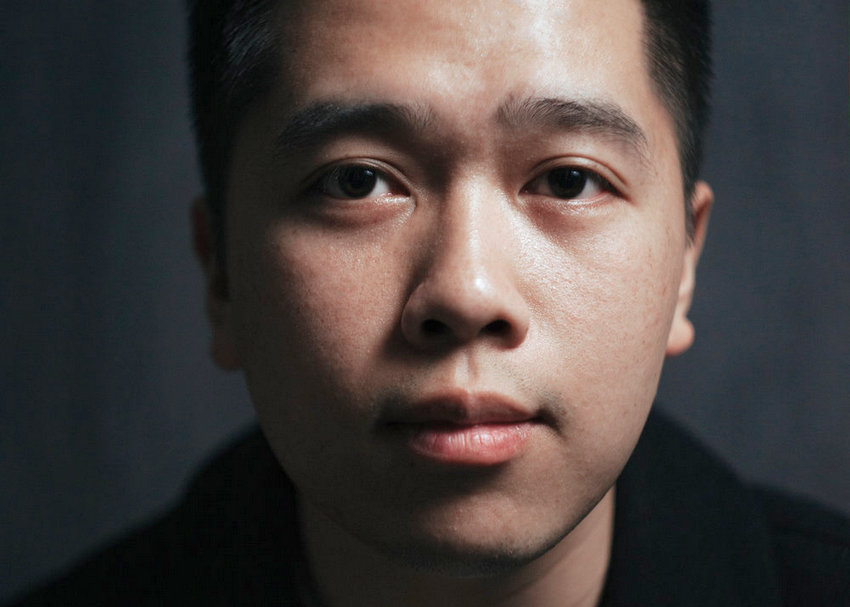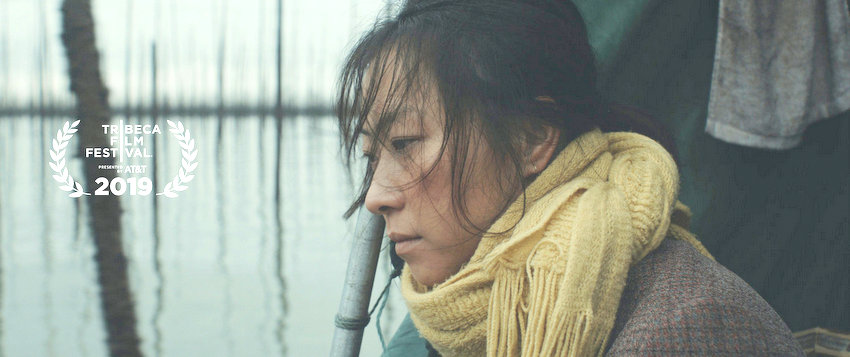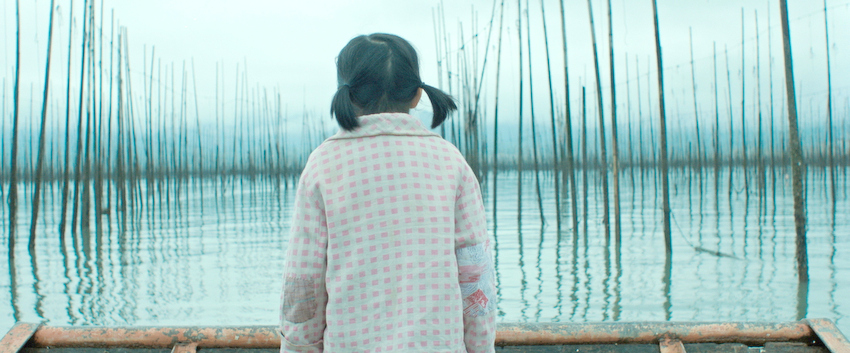
Yuchao Feng is from a small seaside city in China. “Robbin” as he is fondly called holds an NYU MFA in Cinematography. He is an award-winning cinematographer and director. His exposure to two immensely contrasting worlds (China & New York) deeply impacts his perspective in life and cinema. Robbin expresses a rich cultural heritage and unique visual style in his work: he infuses his eastern aesthetics with western storytelling. Robbin was awarded for Best Cinematography at The 2016 Short Pole London International Film Festival. His short film, PEARL 珍珠 made its world premiere at the 2019 Tribeca Film Festival in April. We talk with Robbin about his award-winning film.
indieactivity : Give a background of your personal experience with the story, writing and the production?
Yuchao Feng : The idea for the film first began with an unexpected phone call from my mother about two years ago during one Sunday afternoon in New York (which was way past midnight in China where my mom was calling from). It was shocking not only because my mother and I had grown quite distant (my parents were not always around when I was growing up in China, and we talked even less after I went to the US for college), but also because of the contents of the phone conversation.
Essentially, my mother revealed to me that she just had this horrible nightmare about her own mother, a nightmare that she’s been having since she was six years old. She then proceeded to tell me in detail about why she thinks she’s having the nightmare, which apparently was prompted by the fact that her mother abandoned her when she was six years old. “I think I am probably never going to be able to forgive her,” she said.
After hearing the story, I was shocked. At the time of this phone call, my mother was about forty-five, which meant that she’s basically been having this nightmare for forty consecutive years. As the conversation was unfolding, a piece of buried memory began unraveling. And for the first time, I felt I drew a little closer to her, someone who I previously didn’t know much about. The urge to dig deep overwhelmed me, and I forayed into my mother’s mind to know her. This is why I wrote and directed this film.

It was precious to me that we shoot the film on location in my mother’s hometown, village called Xiapu in the Fujian Province (Southern China). We tried to keep everything true to my mother’s memory and recreated what it looked like back when the event occurred. The water, the bamboo and the moss covered bricks… everything was created to bring that piece of memory to back to life. Filming in there was emotional, and absolutely magical.
indieactivity : Did you start writing with a cast in mind?
Yuchao Feng : To be honest, I didn’t have a cast in mind while I was writing the script. Since this film tells a personal story inspired by events that actually happened to my mother, I wanted to make sure that everything in the script is honest and truthful, and thus at the time I felt that jumping ahead to think about casting seemed to be rather distracting and counterintuitive.
indieactivity : How long did you take to complete the script?
Yuchao Feng : It took me around a month to complete my first draft. I’d spend much of the time writing at a Starbuck, which I believe had just opened at the time.
Since this film is also part of my second year curriculum at the NYU TISCH Graduate Film Program, after the draft was written we would workshop the script for a few weeks to get feedback from different people, and then go back to write another draft. Some of the most helpful and positive feedback I received was from director Todd Solondz, who was my writing teacher at the time. He gave me a lot of constructive criticism that was integral when it came to fine-tuning the script, so I’m very thankful for that.
indieactivity : What was your first project?
Yuchao Feng : My first project is called RED, a four-minute narrative project without any dialogue shot on 16mm film. The film is about a teenage boy who finds comfort, freedom, and affirmation dressing in women’s clothing, and then proceeds to momentarily lose all of that when he sees his father on the street. It was definitely very much inspired by the films of Wong Kar Wai, a director I greatly admire. Even though I was pretty much clueless about how to make a film, I still had such a great time making the film because everything felt so fresh and exciting. It’s still one of my favourite projects I’ve ever done.

indieactivity : Which scene (that made the cut) was the hardest to shoot?
Yuchao Feng : The hardest scene to shoot actually didn’t make the cut, but to answer your question, I suppose it would be the kitchen scene where the mother is first introduced. I intended to shoot the scene in one very long take, which involved a lot of specific and even complicated coordination when it came to blocking and the performances.
As we were shooting, I realized it was just too hard to achieve what I had imagined. The camera moves and the length of the take proved very difficult when there are two six-year-old actors in the scene. After more than 15 takes, I decided to chop the scene up into multiple shots and give the child actors room to take breaks between takes. This decision really improved the kids’ performances and also their stamina, and it in turns taught me how to work with kids and non-actors without sacrificing the quality of the film.
indieactivity : What worked better in this latest production that mightn’t have worked so well in the last one you did?
Yuchao Feng : Again, during the making of this film I learned to give actors room to try different things and to create a space that they can be comfortable in. I think this is especially true when working with children and non-actors, and it is something I’ve only learned gradually throughout all the projects I’ve done. I always find that one of the most important elements in a film is the moments in which we can find the humanity of the characters or of a particular moment, and that’s often not something that can be written perfectly on the page. By giving actors space to improvise and to try different things, chances are that they will give us a more honest depiction of humanity in return. As long as we are patient and have the courage to trust our actors the way they trust us, we will eventually find that moment of authentic emotion.
indieactivity : Is there anything about the independent filmmaking business that you struggle with?
Yuchao Feng : Surprisingly, I’m actually really enjoying the independent filmmaking business at the moment. I’m currently working as a cinematographer on an independent project in China, and there are bold and creative artistic choices we get to make on this film that we wouldn’t be able to do if we were working on a studio film or a film bound by too much constraints. Of course, it would be nice if we could work with a bigger budget, but at the same time I do think more money could bring in limitations that may put a restriction on many of the choices that are made resourcefully and almost spontaneously.
indieactivity : Where do you think your strengths lie as a filmmaker?
Yuchao Feng : I’ve always enjoyed being an observer. I love to observe people, animals, trees, movements within the environment, etc. I enjoy gazing at the tiny details of everyday life and I don’t mind waiting around. Once the moment is right, I would grab my camera and take a snap. Henri Cartier-Bresson taught me a lot on how to freeze a moment with a photograph, and that became my foundation as a cinematographer. I tend to view every frame as a photograph, that way I can ensure that I’m telling a story in each and every shot.
As a writer/director, I think I benefit a lot from my hobby of people watching and observing the behaviours between human beings. I tend to look for real human connections in both real life and in cinema. I love surprises, and I love being surprised by actors who try different things and give me something in their performance that might surprise even themselves. So I’d say that my strength as a filmmaker is to spot, capture, and embrace the unexpected yet truthful nuances in a human interaction.
indieactivity : How was the film financed?
Yuchao Feng : It was primarily funded through an Indiegogo campaign thanks to all my family and friends and many people who I don’t even know. I am extremely grateful to everyone who donated to our Indiegogo campaign.
indieactivity : What do you hope audiences get from your film?
Yuchao Feng : In my film, a mother is faced with a tough situation where she has to abandon her child. As a filmmaker, I do not want to pass judgment on whether the decision she decides to make is right or wrong. Instead, I chose to make the film from the perspective of the child so that the audience could observe and experience the events of the film with her as objectively as possible. I believe that the narrative events and plot mechanics are not as important as the emotional truth of the film. I set out to make a film where everything, from the writing to the photography is coming solely from an emotional, sincere place.
I believe that everyone, no matter where they are coming from, would like to connect with someone they can identify with. Some people find ways to do it, while some unfortunately do not. I hope that by telling this story from a very vulnerable place, I will be able to connect with people who have lived through or can relate to similar experiences as those depicted in the film.
Ultimately, making this film brought me closer to my own mother, who’s troubled past I had never known until now. In the process of writing and directing this film, I had to put myself in her shoes and really understand what she went through. Telling her story not only allowed me to reconnect with her, but also gave me the opportunity to simultaneously reach out to people has can relate to her pain, her growth, and her truth.
indieactivity : What else have you got in the works?
Yuchao Feng : I’m currently working as a cinematographer on a feature film in China, and I’m also circling a few feature projects as the cinematographer. Besides that, I’m also developing another short film that I plan to shoot in the first half of 2020.
Tell us what you think of the interview with “Yuchao Feng” What do you think of it? What ideas did you get? Do you have any suggestions? Or did it help you? Lets have your comments below and/or on Facebook or Instagram! Or join me on Twitter @oladapobamidele
Where We Stay by Florence Bouvy to Screen at CIFF
Where We Stay | CIFF Selected Drama About Friends Hiding Unspoken Truths
This Place by V.T. Nayani: Two Women in Love for the First Time on VOD & DVD March 25
Freestyle Acquires “This Place” for March Release
Sonoma International Film Festival Wraps with Unforgettable Films, Culinary Cinema and Packed Pop-In Events
Sonoma International Film Festival Grand Jury and Audience Award Films Announced
Livestreams with Grandmapuzzles by Emily Sheskin to Screen at CIFF
CIFF Selected Documentary About Twitch Streaming Jigsaw Puzzler
VisionRey Snags Acceptance for 2 Films at FilmApalooza
VisionRey is a Mexican-American Female-Led Film Company
Pomegranate by Weam Namou: on VOD Platforms and DVD on March 4
Freestyle Acquires Dramedy “Pomegranate” for March Release
Into The Spotlight by Thaddeus D. Matula: on VOD and DVD February 21
Freestyle Acquires Doc “Into the Spotlight”









